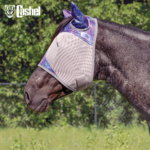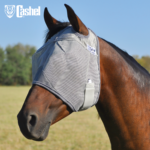Obviously you want your broodmare in peak health for conception, pregnancy and lactation, but do you really need feeds or supplements that claim to target broodmares’
There are special needs in late pregnancy and lactation, but ”broodmare” in the advertising or on the label won’t guarantee any particular product will meet those needs. Although there has been a great deal of interest over the years in looking into various nutrients to see what their effect on fertility might be, the bottom line is that fertility will not be improved by supplementation unless the mare was deficient to begin with.
The mare should be on a carefully balanced diet that provides needed amounts of all major and trace minerals (see sidebar), as well as adequate vitamin A (rarely a problem) and vitamin E (often deficient).
Thin mares have more difficulty conceiving, but overweight mares have more trouble with pregnancy so aim for a middle of the road body condition score, 5 to 6 ??? e.g. Ribs covered but mare not fat.
Approximately 80% of the growth of the foal is completed between the 8th and 11th months of gestation. This is when the mare’s nutrient requirements really begin to increase, and they are at their highest for the first 3 months of lactation.
The phrase ”eating for two” applies even more to the mare who is producing milk than to a pregnant one. Take a little time to look at how much nutritional needs change. Protein requirements, for example, are almost double maintenance in a mare that is lactating. The milking mare needs 771 grams, that’s 1.7 pounds more protein than at maintenance.
Calcium requirements are more than doubled, from 20 grams/day to 56 grams. Since there’s not much chance that any mare is going to be able to eat twice as much as she does at maintenance, this takes some serious attention to nutrition.
Mare Supplements
Let’s take a look at some supplements and see how they compare to the numbers we came up with in the box on ”calculating your mare’s supplement needs.”
Using commercial supplemented feeds can go a long way to meeting your pregnant and milking mare’s needs, but it’s not ideal for every situation. Insulin resistant and/or overweight mares don’t do well with grain feeding. You may also be looking for a supplement that will allow you to feed your mare the same diet you did when she wasn’t pregnant (just more, to meet calorie needs), or the same way to you feed your nonpregnant and nonworking horses, without having to switch your feed brand.
Those of you who use a custom mixed and naturally balanced, but not supplemented, feeding program will also need more for your pregnant and lactating mares.
Calculating Needs
If you’re planning to meet your mare’s needs with a supplement rather than grains, the amount you need to supplement your mare is simple: It’s the difference between what her diet’s providing now and what her pregnancy/lactation needs are. But remember, calorie increases don’t necessarily match mineral and vitamin needs.
To figure out how much your mare needs, you first have to know what she’s getting at baseline. If you don’t, it’s pure guess work, and the price you may pay is the health and soundness of the foal. For this example, we’ll use a 500 kg (1,100 lb.) mare whose maintenance/nonpregnant/nonlactating diet is meeting NRC-suggested minimums. These are the amounts listed under ”maintenance” in the table below.
The reason some of these nutrients don’t take a bigger jump with lactation is because the mare must eat considerably more of the base diet to hold her weight when lactating. In reality, most mares really don’t/won’t eat 70% more food when they are lactating so this has to be taken into consideration. For example, if the mare is eating 5 pounds of grain and 15 pounds of hay in her nonpregnant state, she would have to eat 8.5 pounds of grain and 25.5 pounds of hay when lactating. If she won’t clean up that much, you’ll have to increase her supplements accordingly. If she’ll only clean up half that much, you’ll need to make up 50% of that difference with supplements. Mares that are easy keepers and can’t be fed as much will also come up short.
Warning: The examples and recommendations used in this article refer to an 1,100-pound mare, whose base diet (both hay and grain) when not pregnant was known to be balanced and to meet the minimum NRC requirements for protein, vitamins and minerals. If the base diet is not balanced or adequate, that will change her requirements.
Bottom Line
We looked at widely available supplements targeting broodmares. Futurity Blend 30, Triple Crown 30, and Gro N’ Win were the only ones we felt addressed both the increased protein/amino acid and mineral needs of pregnant and lactating mares. Of these, assuming you start from a base of balanced nutrients that at least meets minimum needs for maintenance, Buckeye’s Gro N’ Win gets the nod as best all-in-one product.






